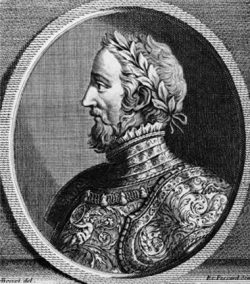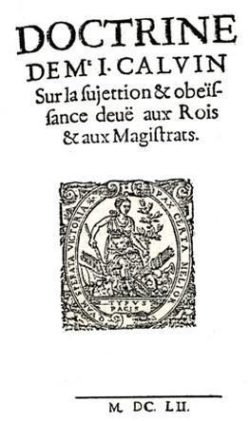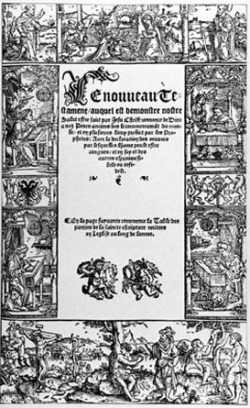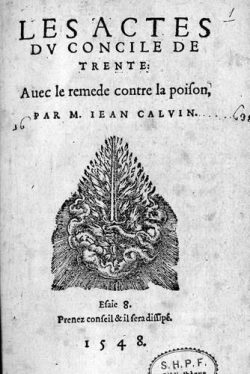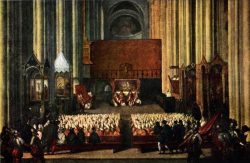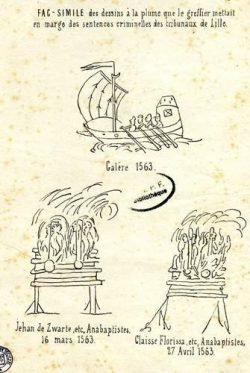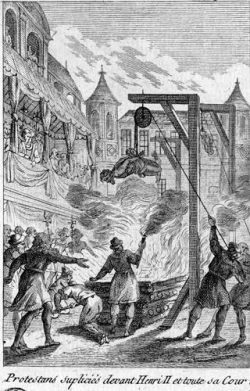The king’s policy
towards the Reformed Church
in France (1555-1562)
Calvin, through representatives from the Church in Paris, presented a confession of faith to King Henri II.
A presentation of the Reformed faith was submitted to the king
In order to prevent any misunderstanding, Calvin wanted to make the position of the Reformed Church known to the king. With this in mind, a confession of faith was presented to King Henri II by the Paris Church. (This confession of faith was probably drawn up by Antoine de Chandieu in 1557). Some extracts from this document were included in the 1559 confession and then in the Confession of Faith. The Church of Paris wanted to make it clear to the king that, as far as religion and politics were concerned, the Reform movement was in no way opposed to royal authority and was not hostile to him. The confession addressed the king as if he were an arbitrator, entreating him to find it “in accordance with the teachings of the Catholic Church”. This confession did not come from a sect, although some people had tried to persuade the king that this was the case, invoking all kinds of false accusations to prove that they were right :
Sire, as we have been forced into a position where we have had to become a sect, apart from the others, our only wish is to assure you of our loyalty to the crown, so that you may judge for yourself whether we have been blamed unjustly or not. (II, p.151)
It was important to convince the king that the Reform movement had nothing to do with any rebellion against royal authority – its members were entirely faithful to him. Calvin ended the letter with the following words : Sire, here is the essence of our faith, without any attempt to disguise it. In this document we have drawn up in detail all the articles of faith, of which others disapprove, but let us only be reproached for what is indeed written in these lines ; may you judge for yourself their worth, when it pleases you to read these words. If we should believe other superstitions which are quite contrary to what we have hereby declared, we humbly pray that you would accept our excuses and be forgiving towards us. We implore you, Sire, as a good father and earthly protector of your obedient subjects, to have pity on those who only seek to serve their God in all simplicity and to do their loyal duty to yourself at the same time. (II, p.158)
Calvin wanted to "reform" the Church
In his letter to the Church in Paris in June 1559, he called on the king, Henri II, “imploring him” (II, p.282) to take significant steps to bring an end to the conflict between Catholics and Protestants, and endeavour to draw them together. Calvin intended to “reform” the Church according to biblical principles.
In the confession of faith which was addressed to King Henri II, he wrote : “we believe that we must keep the unity of the Church”, and encourage “the true Church”, but it was also necessary “to show discernment in choosing the real Church ….and we say that true believers all follow the word of God“.
So ideally, he thought it was better to remain inside the Church. However, it was obvious to all that that many elements, including the reorganisation of the Church on exclusively biblical lines, and the idea of a “true Church”, which “united believers” in the light of the Gospel, made it difficult to be “in agreement” with the “Roman” Church. For Calvin, unity within the Church certainly did not mean rallying around the Papacy. Many of those who had been hoping the Council of Trent would bring about a “reformation” of the Church, were disappointed with the decisions which had been taken.
Calvin, writing to the Church in Paris on 26th February 1561, criticised the Council of Trent. According to him,
This Council is nether Catholic nor legitimate since it is nothing more than a continuation of what has been done before, ratifying once again resolutions which have always been misguided, full of blasphemy and contrary to God’s word. (II, p.380)
Calvin was aware of the difficulties for the Church, but nevertheless insisted on rejecting any compromise
He knew that “the enemies of the poor Church are angry and cruel, issuing terrible threats – it seems that all is lost” (II, p.276). In spite of this, the fight for “the true Church” had to contine. He wrote the following to the Church in Paris (1559) : Believe us when we assure you that we have tried every means that is humanly possible to calm the hateful anger of the enemies, even if it has been only in part, and today no efforts would be spared if there were any glimmer of hope that you could be thus helped. (II, p.282)
Calvin encouraged the Church to stand fast and not waver
He wrote to the Church in Poitou : I know that every time you hold an assembly you are afraid of what might befall you. I also know that your enemies are watching your every move. But this fear of persecution must not stop us from seeking the green pastures of true life, under the protection of our Good Shepherd. So I recommend Him to you, take courage, for He will show you that He does indeed care for His poor sheep – truly it is His business to save them, even from the jaws of the lion. (I, p.433)
But Calvin was against the use of violence in his fight for the reformation of the Church and he never tired of repeating this to the Churches in France to whom he wrote.
Progress in the exhibition
Associated notes
-
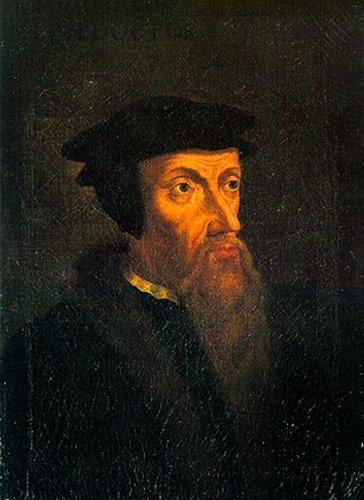
Jean Calvin (1509-1564)
A generation after Luther, the Frenchman Jean Calvin became the organiser of the Reformation : he organised the Church, shaped the doctrine and defined the role of the Church in state government.

